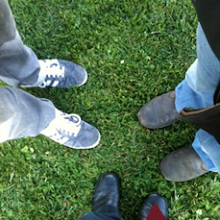Orca grandmothers develop close ties to infants in their pods. Scientists have discovered an evolutionaryreason why humans and whales both have grandmothers.
As post-menopausal females age, the researchers say, they become increasingly interested and helpful in rearing their "grandchildren".
This could help explain why female great apes and toothed whales (cetaceans) have lifespans that extend long beyond their reproductive years.
It is specifically among great apes and toothed whales that menopause and post-reproductive helping have evolved.
Rufus Johnstone and Michaeld Cant Evolutionary biologists
The "grandmother hypothesis" was first proposed in the 1950s. It stated that menopause, which stops a female's fertility well before the end of her lifespan, may have evolved to benefit a social group, because grandmothers went on to play such an important a role in caring for offspring that were already born.
The two scientists developed a mathematical model to study "kinship dynamics" in killer whales (orcas), short-finned pilot whales and humans.This revealed that, as post-menopausal females aged, they developed closer ties to infants.
This showed, the scientists said, an "underlying similarity" between whales and great apes that might otherwise have been masked by the big differences in their social structures.
"Our analysis can help explain why, of all long-lived social mammals, it is specifically among great apes and toothed whale that menopause and post-reproductive helping have evolved".


No comments:
Post a Comment